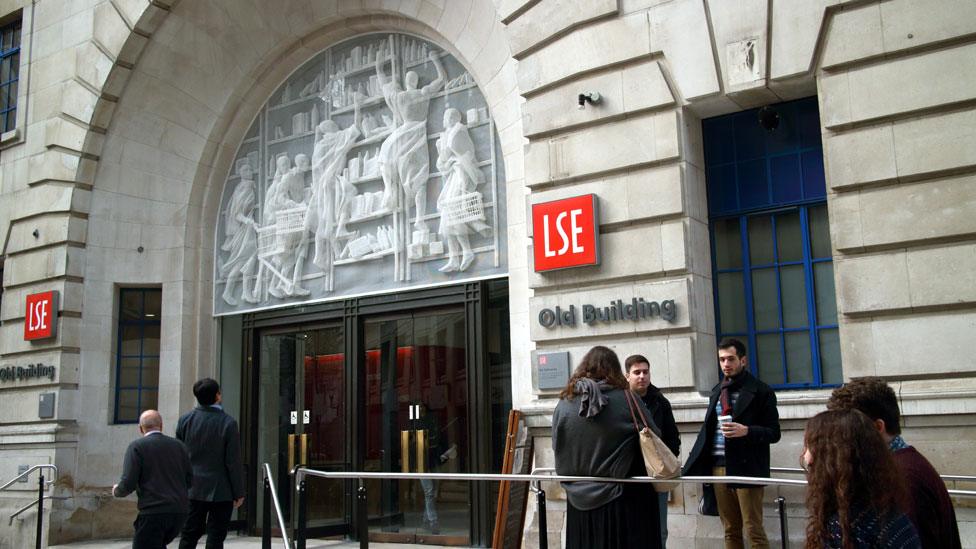Does it really matter which university you study at?
- Published
- comments

Young people are trying to decide where they should apply to university
"Does it really matter which university you study at?"
This is the question that's been chosen by the BBC News audience - and it is a very immediate concern for hundreds of thousands of families wrestling with university application forms.
Of course, on the idealistic side of things, what really matters is that someone is following a course that they really like and in a place that suits their needs.
But there are thornier worries about the cost of university and how much degrees are worth after graduation.
The evidence suggests that going to university remains a good investment. Organisations such as the Organisation for Economic Co-operation and Development (OECD) have tracked whether the rising number of students will erode the benefits in the jobs market.
So far it seems that the graduates have kept their advantage. A changing jobs market has generated more opportunities for graduates and people who went to university are likely to be earning more and are less likely to be unemployed.

Why Sean wrote this:
We asked readers to send in their questions about university education.
The favourite which you selected was this question from Kirsty: "Does it really matter which university you study at?"
Kirsty has three daughters, one currently at university, another planning to go and a third looking to university in the future, so as she says "It's a question we're currently trying to answer.
"Some universities are going to charge higher fees, does this mean we can compare by price? But then will a degree in mathematics from a more expensive university be different in any way? Will future opportunities really depend on the university we choose?
"It seems the more we've tried to answer this question the more questions arise."
Take a look at some of the other questions you've wanted us to answer

Women in particular are likely to benefit economically from being graduates, with a big advantage in earnings compared with women without degrees.
But the next question is whether all universities will deliver similar rewards.
There are all kinds of social rewards and intellectual pleasures of university life, which cannot be chopped up and counted.
But the financial rewards can be measured and they vary significantly between different universities.
Earning power
The Institute for Fiscal Studies, Cambridge University, Harvard University and the Institute of Education, UCL published research on graduate earnings in England earlier this year.
It analysed the incomes of 260,000 graduates and showed a very wide spectrum of likely earnings. At the top was a cluster of universities, headed by the London School of Economics, Oxford and Cambridge.

Medical students are likely to have higher earnings
In these three institutions, 10% of their male graduates had earnings above £100,000 a decade after leaving university. The LSE was the only place where 10% of female graduates were also in this top earning bracket.
There is an earnings pecking order - with about another 30 or so universities, not identified by name, where 10% of graduates are earning above £60,000.
And at the bottom, there are some more awkward figures. There are 23 universities where male graduates are likely to end up earning less than non-graduates - and there are nine universities where that is also the case for women.
But there is another important factor cutting across this - the differences between subjects.
Healthy income
Students taking courses such as medicine, economics, law and maths are likely to be earning much more than the average graduate.
And artists are really going to be struggling in their garrets, as graduates from creative arts courses are likely to be earning less than the average non-graduate.

Graduates from the LSE were among the highest earners
The combination of these two factors is going to decide the likely financial benefits - the university and choice of subject.
But researchers highlight some other questions muddying the waters.
Students do not enter university unshaped by what went before.
How much of higher earnings in later life might be linked to coming from high-income parents, rather than anything to do with higher education?
A key finding of the income research was that graduates from wealthy families ended up earning more than than those from poorer families, even if they studied the same course at the same university.
But there is no escaping the growing sense of stratification in the university sector and differences in status.
Status symbols
Belonging to the Russell Group has become a kind of self-conferred status symbol for its membership.
Although this might sound venerable, it has only existed since the mid-1990s and began life as a group of heads of universities with medical schools, who met at London's Russell Hotel.

Tuition fees are expected to rise again in England
But it has sharpened a sense of difference.
University rankings have also become very influential, further encouraging the idea of a hierarchy of quality.
Even if academics are sceptical about the reliability of such rankings, they will be scrutinised by students applying to university and it becomes almost self-fulfilling.
The appetite for such rankings also reflects the growing numbers of students going to university - and the need to distinguish between different types of degree.
University-blind admissions
Young people are now more likely to get a degree than they were to get five good O-levels in the early 1980s.
And where once it would have been a success to get into any university, it is now increasingly a question of which university.
But if this sounds like a growing polarisation, with top earnings and status clustering around a few elite institutions, there is something of a backlash from employers.

Earnings can be very different according to the university
A succession of big graduate employers have moved towards hiring students in a way that masks which university and school they attended.
This might be presented as advancing the cause of social mobility - but it is also about the self-interest of companies.
Speaking privately, employers will say if they're fighting for business in diverse, inner-city communities, they do not want to send in a line-up of Oxbridge clones.
But for teenagers struggling with application forms for university, how are they meant to choose between similar sounding institutions?
They might say that all degrees are equal, but some are more equal than others.
Join the conversation - find us on Facebook, external